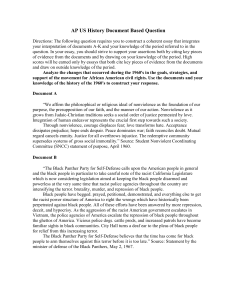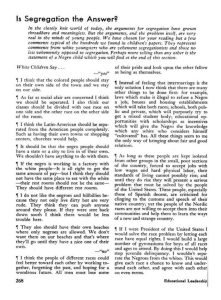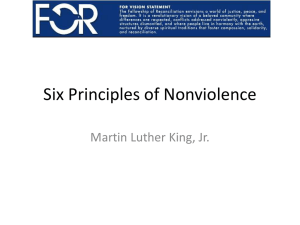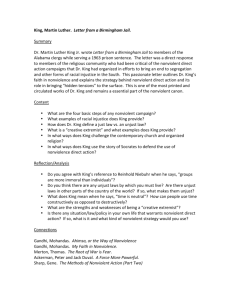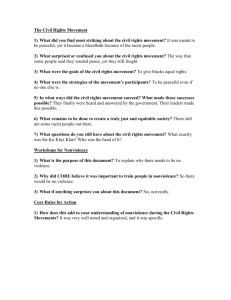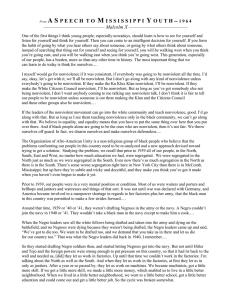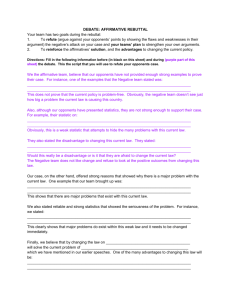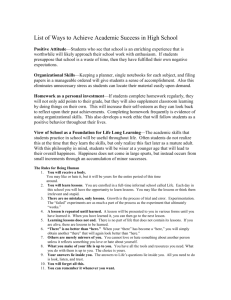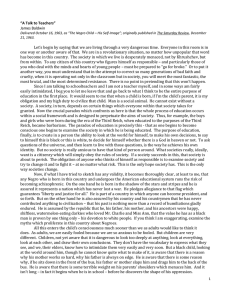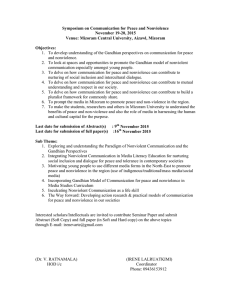Martin Luther King Teacher`s Copy with Answers.doc
advertisement
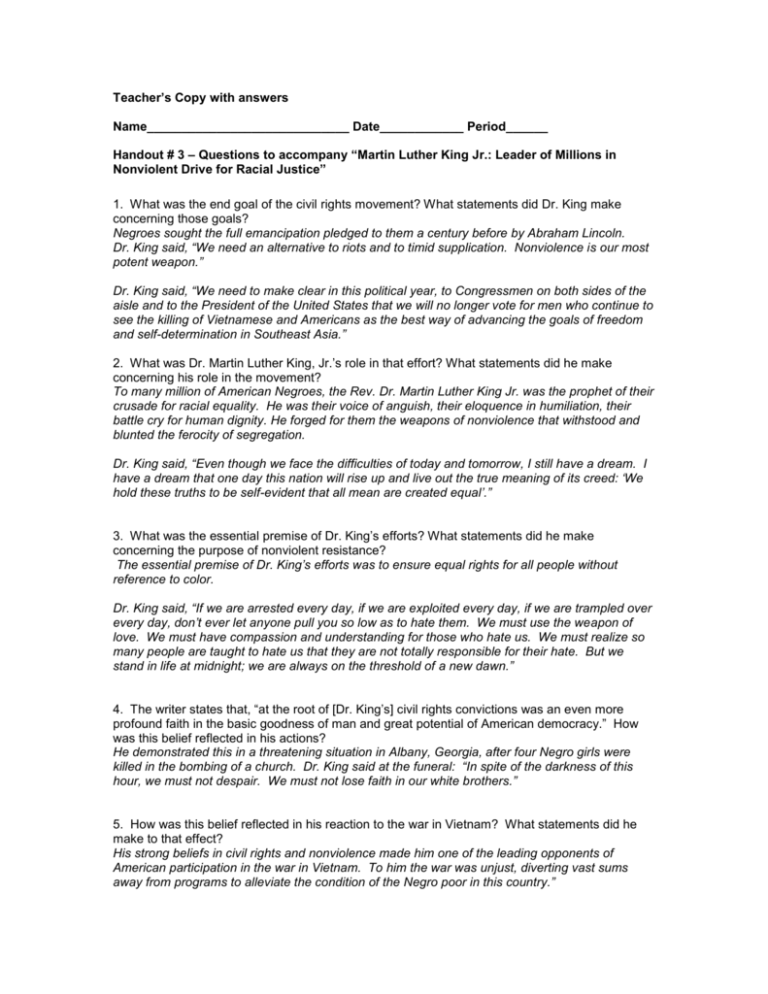
Teacher’s Copy with answers Name_____________________________ Date____________ Period______ Handout # 3 – Questions to accompany “Martin Luther King Jr.: Leader of Millions in Nonviolent Drive for Racial Justice” 1. What was the end goal of the civil rights movement? What statements did Dr. King make concerning those goals? Negroes sought the full emancipation pledged to them a century before by Abraham Lincoln. Dr. King said, “We need an alternative to riots and to timid supplication. Nonviolence is our most potent weapon.” Dr. King said, “We need to make clear in this political year, to Congressmen on both sides of the aisle and to the President of the United States that we will no longer vote for men who continue to see the killing of Vietnamese and Americans as the best way of advancing the goals of freedom and self-determination in Southeast Asia.” 2. What was Dr. Martin Luther King, Jr.’s role in that effort? What statements did he make concerning his role in the movement? To many million of American Negroes, the Rev. Dr. Martin Luther King Jr. was the prophet of their crusade for racial equality. He was their voice of anguish, their eloquence in humiliation, their battle cry for human dignity. He forged for them the weapons of nonviolence that withstood and blunted the ferocity of segregation. Dr. King said, “Even though we face the difficulties of today and tomorrow, I still have a dream. I have a dream that one day this nation will rise up and live out the true meaning of its creed: ‘We hold these truths to be self-evident that all mean are created equal’.” 3. What was the essential premise of Dr. King’s efforts? What statements did he make concerning the purpose of nonviolent resistance? The essential premise of Dr. King’s efforts was to ensure equal rights for all people without reference to color. Dr. King said, “If we are arrested every day, if we are exploited every day, if we are trampled over every day, don’t ever let anyone pull you so low as to hate them. We must use the weapon of love. We must have compassion and understanding for those who hate us. We must realize so many people are taught to hate us that they are not totally responsible for their hate. But we stand in life at midnight; we are always on the threshold of a new dawn.” 4. The writer states that, “at the root of [Dr. King’s] civil rights convictions was an even more profound faith in the basic goodness of man and great potential of American democracy.” How was this belief reflected in his actions? He demonstrated this in a threatening situation in Albany, Georgia, after four Negro girls were killed in the bombing of a church. Dr. King said at the funeral: “In spite of the darkness of this hour, we must not despair. We must not lose faith in our white brothers.” 5. How was this belief reflected in his reaction to the war in Vietnam? What statements did he make to that effect? His strong beliefs in civil rights and nonviolence made him one of the leading opponents of American participation in the war in Vietnam. To him the war was unjust, diverting vast sums away from programs to alleviate the condition of the Negro poor in this country.” Dr. King said, “We need to make clear in this political year, to Congressmen on both sides of the aisle and to the President of the United States that we will no longer vote for men who continue to see the killing of Vietnamese and Americans as the best way of advancing the goals of freedom and self-determination in Southeast Asia.” 6. Who were his opponents and how did they respond to his efforts at non-violent resistance? What statements did Dr. King make in response to his opponents? Dr. King had many opponents, both black and white. He commented, “I have almost reached the regrettable conclusion that the Negro’s great stumbling block in the stride toward freedom is not the White Citizens Counciler or the Ku Klux Klan Klanner, but the white moderate who is more devoted to order than to justice; who prefers a negative peace, which is the absence of tension, to a positive peace, which is the presence of justice.” 7. Why did his beliefs and activities stir up conflict among his supporters? As Dr. King’s words grew more potent, and he was invited to the White House by President Kennedy and Johnson, some critics—Negroes as well as white—noted that sometimes, despite all the publicity he attracted, he left campaigns unfinished or else failed to attain his goals. 8. In what way was Dr. King between extremes? Explain your answer. Dr. King knew he was between extremes. He said, “America, you’re strayed away. You’ve trampled over 19 million of your brethren. All men are created equal. Not some men. Not white men. All men. America, rise up and come home.” The possibility that he might someday be assassinated was considered by Dr. King on June 5, 1964, when he reported in St. Augustine, Florida, that his life had been threatened. He said: “Well, if physical death is the price that I must pay to free my white brothers and sisters from a permanent death of the spirit, then nothing can be more redemptive.”
